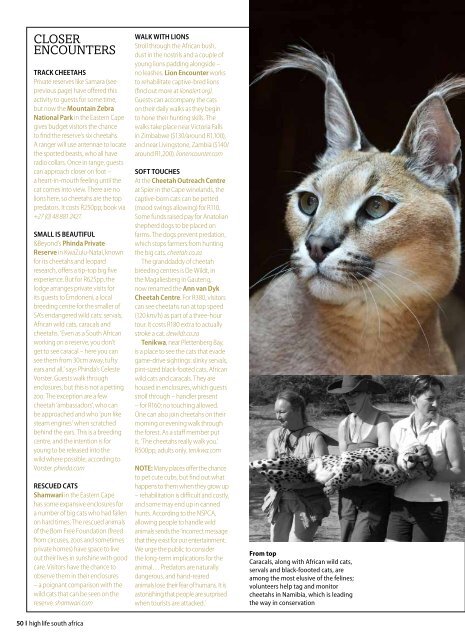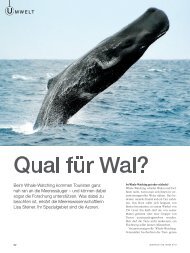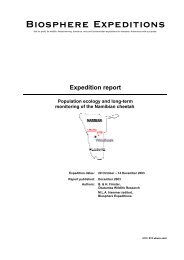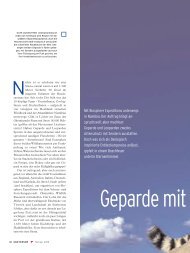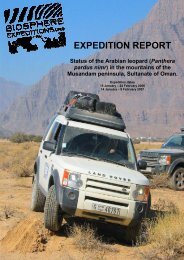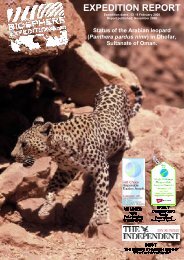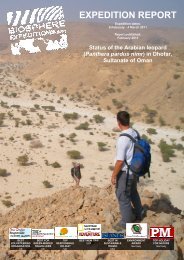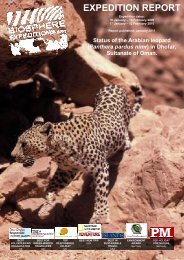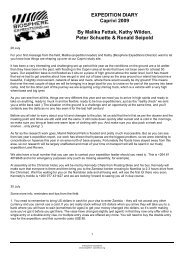View article 1.20 Mb - Biosphere Expeditions
View article 1.20 Mb - Biosphere Expeditions
View article 1.20 Mb - Biosphere Expeditions
You also want an ePaper? Increase the reach of your titles
YUMPU automatically turns print PDFs into web optimized ePapers that Google loves.
CLOSER<br />
ENCOUNTERS<br />
TRACK CHEETAHs<br />
Private reserves like Samara (see<br />
previous page) have offered this<br />
activity to guests for some time,<br />
but now the Mountain Zebra<br />
National Park in the Eastern Cape<br />
gives budget visitors the chance<br />
to find the reserve’s six cheetahs.<br />
A ranger will use antennae to locate<br />
the spotted beasts, who all have<br />
radio collars. Once in range, guests<br />
can approach closer on foot –<br />
a heart-in-mouth feeling until the<br />
cat comes into view. There are no<br />
lions here, so cheetahs are the top<br />
predators. It costs R250pp; book via<br />
+27 (0) 48 881 2427.<br />
SMALL IS BEAUTIFUL<br />
&Beyond’s Phinda Private<br />
Reserve in KwaZulu-Natal, known<br />
for its cheetahs and leopard<br />
research, offers a tip-top big five<br />
experience. But for R625pp, the<br />
lodge arranges private visits for<br />
its guests to Emdoneni, a local<br />
breeding centre for the smaller of<br />
SA’s endangered wild cats: servals,<br />
African wild cats, caracals and<br />
cheetahs. ‘Even as a South African<br />
working on a reserve, you don’t<br />
get to see caracal – here you can<br />
see them from 30cm away, tufty<br />
ears and all,’ says Phinda’s Celeste<br />
Vorster. Guests walk through<br />
enclosures, but this is not a petting<br />
zoo. The exception are a few<br />
cheetah ‘ambassadors’, who can<br />
be approached and who ‘purr like<br />
steam engines’ when scratched<br />
behind the ears. This is a breeding<br />
centre, and the intention is for<br />
young to be released into the<br />
wild where possible, according to<br />
Vorster. phinda.com<br />
rescued cats<br />
Shamwari in the Eastern Cape<br />
has some expansive enclosures for<br />
a number of big cats who had fallen<br />
on hard times. The rescued animals<br />
of the Born Free Foundation (freed<br />
from circuses, zoos and sometimes<br />
private homes) have space to live<br />
out their lives in sunshine with good<br />
care. Visitors have the chance to<br />
observe them in their enclosures<br />
– a poignant comparison with the<br />
wild cats that can be seen on the<br />
reserve. shamwari.com<br />
WALK WITH LIONS<br />
Stroll through the African bush,<br />
dust in the nostrils and a couple of<br />
young lions padding alongside –<br />
no leashes. Lion Encounter works<br />
to rehabilitate captive-bred lions<br />
(find out more at lionalert.org).<br />
Guests can accompany the cats<br />
on their daily walks as they begin<br />
to hone their hunting skills. The<br />
walks take place near Victoria Falls<br />
in Zimbabwe ($130/around R1,100),<br />
and near Livingstone, Zambia ($140/<br />
around R1,200). lionencounter.com<br />
soft touches<br />
At the Cheetah Outreach Centre<br />
at Spier in the Cape winelands, the<br />
captive-born cats can be petted<br />
(mood swings allowing) for R110.<br />
Some funds raised pay for Anatolian<br />
shepherd dogs to be placed on<br />
farms. The dogs prevent predation,<br />
which stops farmers from hunting<br />
the big cats. cheetah.co.za<br />
The granddaddy of cheetah<br />
breeding centres is De Wildt, in<br />
the Magaliesberg in Gauteng,<br />
now renamed the Ann van Dyk<br />
Cheetah Centre. For R380, visitors<br />
can see cheetahs run at top speed<br />
(120 km/h) as part of a three-hour<br />
tour. It costs R180 extra to actually<br />
stroke a cat. dewildt.co.za<br />
Tenikwa, near Plettenberg Bay,<br />
is a place to see the cats that evade<br />
game-drive sightings: slinky servals,<br />
pint-sized black-footed cats, African<br />
wild cats and caracals. They are<br />
housed in enclosures, which guests<br />
stroll through – handler present<br />
– for R160; no touching allowed.<br />
One can also join cheetahs on their<br />
morning or evening walk through<br />
the forest. As a staff member put<br />
it, ‘The cheetahs really walk you.’<br />
R500pp, adults only. tenikwa.com<br />
Note: Many places offer the chance<br />
to pet cute cubs, but find out what<br />
happens to them when they grow up<br />
– rehabilitation is difficult and costly,<br />
and some may end up in canned<br />
hunts. According to the NSPCA,<br />
allowing people to handle wild<br />
animals sends the ‘incorrect message<br />
that they exist for our entertainment.<br />
We urge the public to consider<br />
the long-term implications for the<br />
animal… Predators are naturally<br />
dangerous, and hand-reared<br />
animals lose their fear of humans. It is<br />
astonishing that people are surprised<br />
when tourists are attacked.’<br />
From top<br />
Caracals, along with African wild cats,<br />
servals and black-foooted cats, are<br />
among the most elusive of the felines;<br />
volunteers help tag and monitor<br />
cheetahs in Namibia, which is leading<br />
the way in conservation<br />
50 high life south africa


